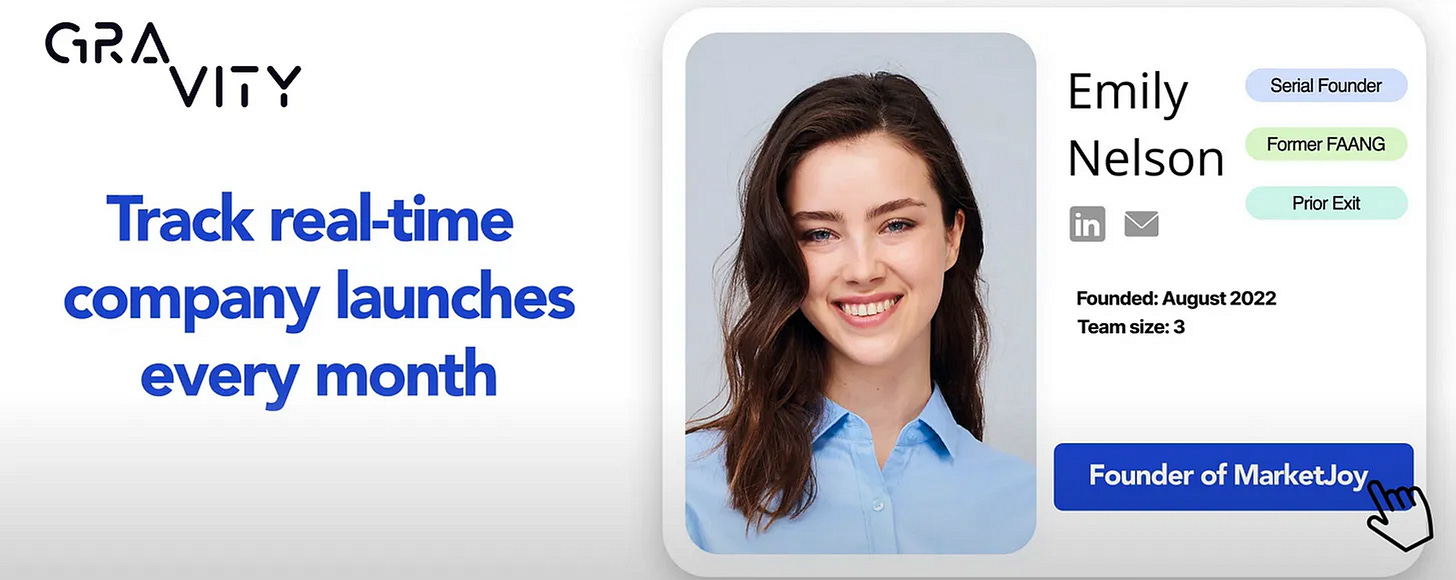The impact of AI on the cost of starting and running a business
DDVC #33: Where venture capital and data intersect. Every week.
👋 Hi, I’m Andre and welcome to my weekly newsletter, Data-driven VC. Every Thursday I cover hands-on insights into data-driven innovation in venture capital and connect the dots between the latest research, reviews of novel tools and datasets, deep dives into various VC tech stacks, interviews with experts and the implications for all stakeholders. Follow along to understand how data-driven approaches change the game, why it matters, and what it means for you.
Current subscribers: 7,947+, +200 since last week
Brought to you by Gravity - Your all-in-one platform with billions of data points on founders and startups
Unlike other data providers, Gravity tracks new company launches and all funding events each month while diving deep into the key insights around the founders of these companies in an easy-to-use dashboard that helps you uncover their FounderDNA™ - founder characteristics such as prior exits, past experiences and much more! Sign up for free and take advantage of the 14 day free trial
Every board meeting in 2023 thus far had the same item on the agenda: What’s the impact of AI on our business? More specifically:
What’s the impact of AI on our own product?
What’s the impact of AI on our daily routines and workflows?
Today, I’d like to share my generalized perspective on both of the above questions and why I believe it will be significantly easier to start a software company in the future. Please challenge my thoughts and share your perspectives with me!
1) The impact of AI on your product
Of course, the answer to this question depends a lot on the product. Flipping things around and looking at the question from a user’s perspective, there are two main groups of companies/products:
Existing (non-AI) incumbents like Microsoft (with “AI-powered Teams Premium”), Notion (with “Notion AI”) or Duolingo (with “Duolingo Max”) extending their well-established and broadly adopted product offering with AI-powered features.
New (AI-native) challengers like Jasper, CopyAI or Runway rethinking products from scratch with AI in their core.
While the “non-AI incumbents” are likely to have great penetration and large, trusted user bases that are familiar with their products, “AI-native challengers” are able to leverage this new technology and rethink their solutions from scratch. Wearing my investor hat, the major question is whether add-ons can be as good as something purposefully designed from scratch?
Clearly, challengers believe the answer is no. This is why they started their companies in the first place. The majority of companies across startups, scale-ups, SMBs and enterprises, however, falls into category 1 above. Therefore, they should urgently explore how AI-powered add-ons or even new product lines can bring their offerings as close to AI-native solutions as possible.
The longer incumbents wait to add AI-powered features, the higher the chances their customers see their own competitors getting more done with less by leveraging other AI-native solutions. At some point, FOMO will exceed the friction and switching costs of migrating to a new AI-native tool, resulting in slowly but gradually fading customer bases for the incumbents.
Take a user-centric view to explore potential for AI-powered features in your existing product
Depending on the stage of the company, products are more or less complex. The less (more) established the company and product, the easier (more difficult) it becomes to change fundamental parts of the product.
Independent of the existing product complexity, it seems most intuitive to take a user-centric view, map all of the workflows that can be executed with the existing product (shadowing users helps a lot), and then scrutinize every single step to see if and how it can be automated/changed with LLMs.
Here, incumbents can benefit from external expertise as well as partnerships and deep integrations with LLMs providers. At some point, they might even want to consider verticalized LLMs tailored to their business, just like Bloomberg GPT.
2) The impact of AI on your workforce
While Morgan Stanley and others predict AI to create a $ 6+ Trillion opportunity and significant productivity gains to be captured, the majority of desk workers haven’t changed their workflows or tool stack at all. Likely, because incumbents are just starting to launch AI-powered features and the fact that most professionals didn’t yet face enough pressure to leave their comfort zone and test out AI-native solutions. This will change. Soon.
As a result, I expect every knowledge worker, literally everyone who performs a task in front of a screen, to leverage AI and create more as well as better output with less input. It started with developers (👋🏻 Github Copilot), continued with communication (👋🏻 Jasper) and designers (👋🏻 Stability), and will soon be prevalent across sales, customer support, HR and every other part of a company.





